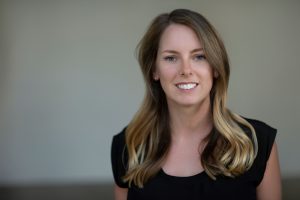Perspectives of Scientists Who Become Targets: Maria Caffrey
This series profiles scientists who have been threatened with legal attacks or harassed by politically and ideologically motivated groups. What these researchers experienced, how they responded, and the lessons they learned provide valuable guidance for other scientists, and will help all readers understand the issues climate scientists may encounter because of their work.
###

Maria Caffrey is a paleoclimatologist who, from 2012 until 2019, was employed as a Partner with the National Park Service (NPS). She was forced to defend a scientific report reflecting years of her research from concerted censorship efforts by several senior officials at the NPS. Caffrey’s report was targeted because it explicitly referenced human-caused or anthropogenic climate change.
In 2013, the NPS named Caffrey the principal investigator on a project to study how sea level rise and storm surge will impact 118 coastal national parks under a variety of different climate change scenarios. Since climate change is primarily driven by human consumption of fossil fuels and the resulting greenhouse gas emissions, Caffrey examined different scenarios based on various projected levels of future human-caused greenhouse gas emissions. In other words, Caffrey’s project was designed as a fundamental examination of how human-caused climate change will affect coastal national parks. Unsurprisingly, the scientific report she ultimately authored therefore referenced anthropogenic climate change in describing the purpose and methods behind her work.
Caffrey completed her research in 2016, and began to finalize her report, which at first proceeded as normal through the standard review and editing. However, following the November 2016 election and the subsequent inauguration of President Trump, there was a series of increasingly mysterious delays in the publication process.
The true reason for the roadblocks eventually became clear to Caffrey towards the end of 2017 when her supervisors at the NPS began explicitly pressuring her to remove the references to anthropogenic climate change in her report. Park officials went so far as to threaten that, if she refused to do so, the NPS might release the report without attributing her as the author or might decide against releasing the report altogether. Both of these would have been devastating outcomes for a scientist who had devoted years of her professional life to this research. These supervisors, including some high-level NPS officials, made clear that they wanted the references to anthropogenic climate change removed because the Trump administration was hostile to discussions of man-made climate change, and such explicit references in an NPS publication might draw unwanted scrutiny of the entire program in which Caffrey worked.
Nonetheless, Caffrey refused to succumb to this pressure to censor her scientific work on climate change and stood her ground. “By asking me to censor my work, I felt my colleagues were essentially asking me to lie to the American people about a grave threat to our most treasured lands,” Caffrey said. Unfortunately, rather than respect the stance she was taking for scientific integrity, some of Caffrey’s supervisors and colleagues at the NPS attempted to remove the references to anthropogenic climate change from her report while she was out on maternity leave without her knowledge or approval.
Caffrey raised the alarm among her NPS colleagues about this shocking violation. She had to mount a strong defense of her work over the course of more than a year, but she ultimately succeeded in getting the NPS to release her report in its uncensored form, with the references to anthropogenic climate change reinstated. According to Caffrey, “Thanks to the advice provided by CSLDF, I felt empowered enough to say ‘no’ to what I believe were politically motivated edits. I have no doubt my report would never have been released were it not for the support I was given.”
Caffrey bravely stood up for science by refusing the attempted removals and fought to ensure that the scientific community and the public would receive the benefit of her publicly-funded research on how climate change will affect our national parks. Unfortunately, the personal cost to her was dramatic. Within months after the publication of her report, she was removed from her role leading the still-unfinished sea level rise project of which her report formed part. She was forced to switch groups within the NPS and, although her new co-workers and supervisors were enthusiastic about her work, her new division chose not to continue her funding.
With the help of the Climate Science Legal Defense Fund, Caffrey filed a scientific integrity complaint in 2018 and a whistleblower complaint in 2019. She also testified to Congress about the retaliation she experienced from the NPS when she spoke up about the attempted censorship of her work. Regrettably, as of August 2021, her whistleblower complaint remains unresolved more than 2 years later. CSLDF is proud to be the organization helping her navigate this ongoing legal process. “No scientist should be forced to make the decision between their career and speaking the truth. I am so grateful that CSLDF exists for any other scientists that are put in this position in the future,” Caffrey told us.
After weathering this difficult time, Caffrey is now happily back to work as a climate scientist in the private sector. However, her story speaks to how easily government censorship can undermine sound and objective science, and the urgent need for stronger legal protections for federal science.